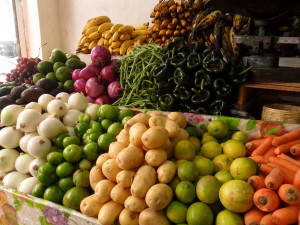 By Nicola Cucuiet and Sylvia Klinger
By Nicola Cucuiet and Sylvia Klinger
Leek
Leeks come from the onion plant in the Allium family. These vegetable has a lot of nutritional benefits: it is low in calories and has a lot of worthy nutrients, flavonoids antioxidants, minerals and vitamins such as folic acid, niacin, riboflavin, thiamin, vitamin A, iron and calcium that are very important for the long term management of health. Studies have shown that the consumption of leek may lower cholesterol levels and has anti fungal, viral and bacterial activities.
Cabbage
Cabbage is a nutritional powerhouse when it comes to dietary benefits, but is rarely included as a regular vegetable in diets. This particular vegetable is high in vitamin C, glutamine, calcium, iron, magnesium, vitamin B6, amino acids and fiber. The benefits revolving around the consumption of this vegetable may include: cholesterol lowering proprieties, anti inflammatory proprieties . Cabbage can be successfully included in a diet, because it is low in calories.
Brussels spouts
Brussels sprouts are vegetables that resemble cabbages and are very high in protein, dietary fiber, vitamins, minerals, and antioxidants. Brussels sprouts are an excellent source of vitamin C, vitamin A and vitamin K as well as minerals like copper, calcium, potassium and iron. This vegetable is low in calories so it can be included as a nutritious and useful aid in weight loss programs.
Carrots
Most of the benefits of carrots can be attributed to its beta carotene and fiber content. Carrots are also rich in vitamin A, Vitamin C, vitamin K and potassium. Studies have shown that carrots may have relevant cholesterol lowering proprieties thus reducing the risk of developing heart related problems. Carrots are famous for improving eye sight thanks to their high content of vitamin A, but they also help prevent some types of cancers and macular degeneration thanks to their beta carotene content.
Cauliflower
Cauliflower is a vegetable that provides the best source of vitamin C after citrus fruits. Cauliflower have no fat and it is high in folic acid, fiber and potassium. Cauliflower containing diets have been linked to cancer prevention, because of the fact that cauliflower provides nutrient support for the body’s natural detox ability, as well as anti inflammatory, digestive and cardiovascular benefits. Cauliflower like all cruciferous vegetables offer a wide variety of benefits, and should be included in a regular healthy diet.
Kale
Kale is a very nutritious leafy green vegetable. It is low in fat, cholesterol and high in antioxidant benefits due to it’s high beta carotene, lutein and phytochemicals content that protect against prostate and colon cancer. Kale is also rich in vitamin A, K and vitamin C and minerals like copper, calcium, potassium and iron, minerals that are important in the cellular oxidation, production of red cells, controlling heart rate and blood pressure. This vegetable is very nutritious and may offer protection against a number of deficiencies.
Turnip
Turnips are root vegetables low in calories, but high in nutrients with a very good source of antioxidants, minerals and dietary fiber. These roots are high in vitamin A, vitamin C and the leafy tops are an excellent source of vitamin K and B complex vitamins. Turnips consumed fresh are high in minerals as well, like calcium, copper, iron and manganese.
Sweet potatoes
Sweet potatoes provides you with 90 calories per 100 grams which is a little more than the regular potato but this particular type of potatoes is rich in fiber, antioxidants, vitamins and minerals and is low in cholesterol and saturated fats. Sweet potatoes are an excellent source of vitamin A, beta carotene, vitamin B5, and minerals such as iron, calcium, magnesium and potassium which are very important for the body.
Endives
Endives are green leafy vegetables that are filled with nutritional benefits. This salad looking vegetable is filled with vitamins like vitamin C and vitamin A, folic acid, panthotenic acid, and beta carotene. Endives are low in calories – 100 g of leafs contain 17 calories but provide you with an abundance of dietary fiber. Current studies have shown that this vegetable may provide cholesterol lowering proprieties. Additionally endives are a good source of minerals such as manganese, copper, iron and potassium.
Butternut squash
Butternut squash is low in calories providing 45 calories per 100g. This squash is low in cholesterol and has no saturated fats, but is rich in dietary fiber and phytonutrients. Butternut Squash contains the most vitamin A out of all winter vegetables along with B complex vitamins like folic acid, riboflavin, niacin and phantotenic acid. Butternut squash also contains minerals like iron, zinc, copper, calcium and potassium. Butternut squash seeds are also very nutritious providing dietary fiber and mono unsaturated fatty acids.
Live life and love it. Eat well

